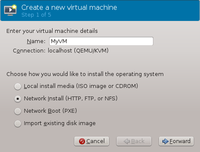Virt-manager
From Lsdf
Jump to navigationJump to search
UNDER CONSTRUCTION
A kvm image can be created on any linux system. The page describes how to install a kvm image using the virt-manager gui. Alternatively, the command line tool virsh could be used.
prerequeste
The following packages are needed:
- libvirt-daemon-kvm
- qemu-kvm
- virt-manager
It is recommanded to use a CPU with virtualization support:
egrep '^flags.*(vmx|svm)' /proc/cpuinfo
Make sure libvirtd is running:
/etc/init.d/libvirtd restart
Prepare a network bridge:
RedHat (CentOS, Fedora)
/etc/sysconfig/network-scripts/ifcfg-br0
DEVICE=br0 TYPE=Bridge BOOTPROTO=dhcp ONBOOT=yes NM_CONTROLLED=no
/etc/sysconfig/network-scripts/ifcfg-eth0
DEVICE=eth0 HWADDR=00:11:22:33:44:55 ONBOOT=yes NM_CONTROLLED=no BRIDGE=br0
brctl addbr br0 brctl addif br0 eth0 brctl show bridge name bridge id STP enabled interfaces br0 0080.000000000000 no eth0 ifup br0
Note that the NetworkManager does not support bridges.
Ubuntu
Installation of Image
- Start virt-manager (as superuser) and click on 'Create a new virtual machine' button:
- Enter a name for your VM and choose the type of installation of the OS. This example will show how to install CentOS6 with an netinstall iso image. Choose Local install media and click forward.
- Enter the local path to the netinstall iso image
Converting an Image
- Converting a raw image to qcow2:
qemu-img convert -O qcow2 myraw.img myqcow2.qcow2
